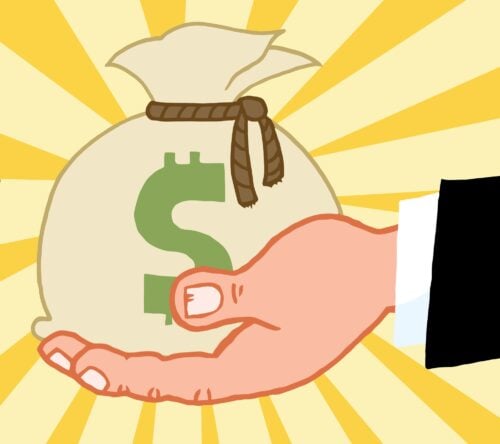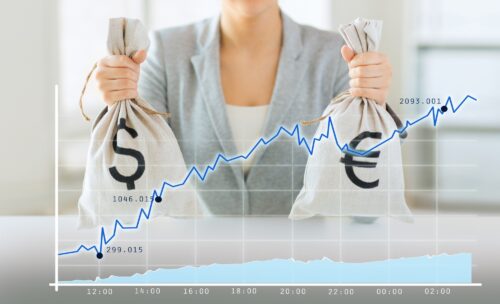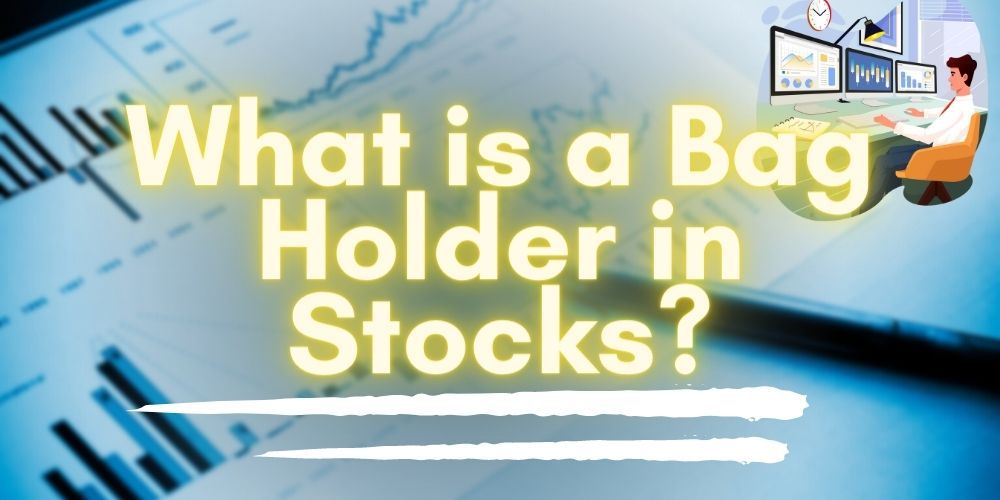Financial forums often discuss the term bag holder pejoratively for naïve investors. But what is a bag holder in stocks, and why is it bad?
Below we explore the meaning of the expression, why folks end up as bag holders, and what they can do to avoid it.
What Is a Bag Holder in Stocks?
The term bag holder is financial slang for an investor who holds on to a stock for too long, even though it is losing value.
The share eventually falls to such a low value that it becomes absolutely worthless.
Bag holders tend to buy such securities when they are at their highest price because market “gurus” and social media experts are waxing eloquent about them.
Then, they hold on to it as the stock price starts to fall, hoping it will make a recovery and they will get their investment back.
Unfortunately, these traders keep clinging on to such losing positions even though they know there is no recovery from where the share has fallen.
Retail investors are the usual suspects when becoming bag holders.

They often have limited knowledge about making profitable investments. In trying to make a quick buck, they end up trusting the market buzz.
Such traders often do not have the means or understanding to analyze the company’s fundamentals.
When their bets fail, they keep holding the securities to get their money back and become a bag holder.
But where does this colorful expression come from? Does it have something to do with bagger stocks?
We look at the origins, history, and meaning of the term in this blog and some of the reasons behind this seemingly incongruous behavior.
Understanding how traders can avoid becoming the subject of such major financial faux pas is important.
We cover this aspect in detail as well.
Does It Mean the Same Thing in Crypto?
Yes, the expression means exactly the same for crypto trading.
In fact, the several ups and downs in the cryptocurrency trading market have often left many bag holders in their wake.
The recent FTT fiasco is a textbook example.
At its peak, the Sam Bankman-Fried created FTT traded at almost $80 and had 250 million such coins in circulation.
In November of 2022, following a report regarding the FTX’s liquidity crisis and its subsequent failed deal with Binance, the exchange and currency crashed.

What was left behind were investors holding a coin that was now nearly worthless.
Yet, a few still held on and became bag holders in the process.
Frighteningly, FTT today is trading at less than $2.
Those who would have bought at its peak in 2021 would be poorer by nearly $75 per coin.
Where Did the Phrase Come From?
Several origin stories lay claim to being the true antecedents of the bag holder definition.
Some believe the term originates from the days of the great depression.
In those days, soup kitchens and bread lines often had long queues of people holding potato bags to carry the food back home.
Hence, “left holding a bag” refers to those with very little left.
Another explanation says that the expression comes from the 1600s in Britain.
In those days, giving “someone the bag” meant leaving them with the blame for something while others got away.
For example, it could be used in a sentence like this one:
“When the firm collapsed, Alex, the director, was left holding the bag while the rest of the board exited without a blemish.”
One last theory places the origin in mid-18th century Britain.
In this idiom, a bag holder was a person being distracted while crooks got away with the contents of the said bag.
Is It the Same as a Bagger?
No, a bagger stock is not the same as a bag holder. In fact, it is quite the opposite.
Such a share offers returns that are multiple times what its original price was.
These are undervalued securities with solid fundamentals.
Such companies often have well-established corporate governance and a proven revenue model.
They are just waiting for the right push or market conditions to propel them toward scaling.
Therefore, bagger stocks are good ones to hold onto for an extended period.
What Is a 3 Bagger in Stocks?
A bagger that grows three times its original price is a 3-bagger.
One that ends up ten times larger than what it was bought for is a 10-bagger, and so on.

The generic term for such stocks is multi-bagger.
This is often a catch-all for stocks that experts believe will grow exceedingly well.
Is It the Same as Chasing the Bag?
No, “chasing the bag” is entirely different from “left holding the bag.”
It is an expression that means working hard to achieve success.
For example, one might say something like, “I am chasing the bag right now and don’t have time for fun and games.”
Do You Ever Want to Be Holding the Bag?
No, bag-holding is the worst situation for an investor to be in!
It is a losing position that can only bring further ruin the longer one stays with it.
Traders should never allow themselves to become bag holders.
One should always have an exit strategy in mind before getting into a stock, no matter how good the opportunity looks.
Here are some signs that a stock is heading toward becoming the proverbial “bag”:
- Lots of hype not rooted in fundamentals
- Poor corporate governance track record
- An unproven or bad management team
- Weak financial ratios
- Declining market share
- An unsustainable business model with little or no revenue
An investor should learn the art of identifying these markers and avoiding such securities.
Sometimes, a share might fall on bad times simply due to market conditions, and such opportunities should not be confused with bag holders.
For example, industries that are cyclical and currently on a down cycle are likely to grow back when the time comes.
Unforeseen geopolitical events can sometimes cause fundamentally good companies to lose value for an extended period.
The ongoing war in Ukraine created such conditions for many firms.
But if they have a sound business, they will eventually bounce back.
Who Usually Ends Up Holding the Bag?
Unfortunately, it is most often the hapless retail investor who often ends up holding a bag.
Since their knowledge of the markets is limited, they are more prone to be swayed by word of mouth.
They often do not understand how to analyze a company’s fundamentals or utilize technical analysis to determine the right time to enter a stock.

There are several such instances in the past when this has happened: meme stocks, Dogecoin, FTT, Enron energy, and several penny stocks.
Typically a combination of the following problems creates a bag holder:
- Lack of research
- Fear of missing out due to social media hype
- Lack of an exit strategy
- Investor psychology
The last of these combines the sunk cost fallacy and disposition effect, which we explain below.
Disposition effect
Simply put, the disposition effect is a fancy name for the fact that no one likes to lose money.
When an investment turns sour, those holding the stock refuse to quit hoping to eventually come out on top.
All humans have an inherent bias toward clinging to losers for too long and quitting on winners too quickly.
We prefer not to lose, but we don’t care as much about making our wins bigger.
The concept is, in fact, so well known that there is a separate field of research called prospect theory that analyzes it.
There are many examples of this outside the arena of finance.
For example, experiments have shown that most people would love to get $50.
But when told that they will be offered $100 and then made to lose half of it, the response is not as enthusiastic (despite the same net result).
How we think of income taxes is another example of this.
Many prefer not to get small bonuses because the additional tax burden is too high.
This is despite the fact that the net result is positive for them.
Sunk Cost Effect
Investors hate the idea that money they have put into something has simply vanished.
Such money is known as a sunk cost.
They would rather wait indefinitely to see their money recover than exit with a loss.
In fact, sometimes traders intentionally overlook such transactions simply because the loss hasn’t been registered in their books so far.
They keep going, hoping it will recover by the time it gets recorded in their financial statements.
How to Avoid It
The simple answer is deep analysis, research, and keeping an exit door ready.
One must understand the company’s fundamentals, competitive landscape, future prospects, and more before investing money.
It is also important to check the views from multiple expert sources before believing in a share.
Even if you are sure about it, know that there is always risk in any transaction on the stock market.
Hence, create an exit strategy and use tools such as stop loss and hedging instruments to minimize failures.
Always remember that while it is human nature to hold on, smart traders should never spend more on a losing trade.
Throwing good money after bad is never worth it.
One final tip is to stay away from excessive hype.
Too much bullishness from several quarters often indicates that something fishy might be going on.
Final Thoughts
An investor should avoid becoming a bag holder at any and all costs, whether it be stocks or the highly volatile crypto markets.
It is easy to buy into the hype and cling to a position even when you know it is going down.
There are several psychological reasons why this happens, including the disposition effect and the sunk cost fallacy.
Avoiding these phenomena is a simple matter of education and financial discipline.
Take your time to diligently analyze potential investments instead of listening to self-proclaimed experts.
Take a deep look at the fundamentals and ensure there is value in the investment.
Study basic technical analysis to help you understand when to enter the market.
And lastly, keep a way out for yourself in all cases; don’t fall into the trap of holding on for too long.


 Tags:
Tags:










